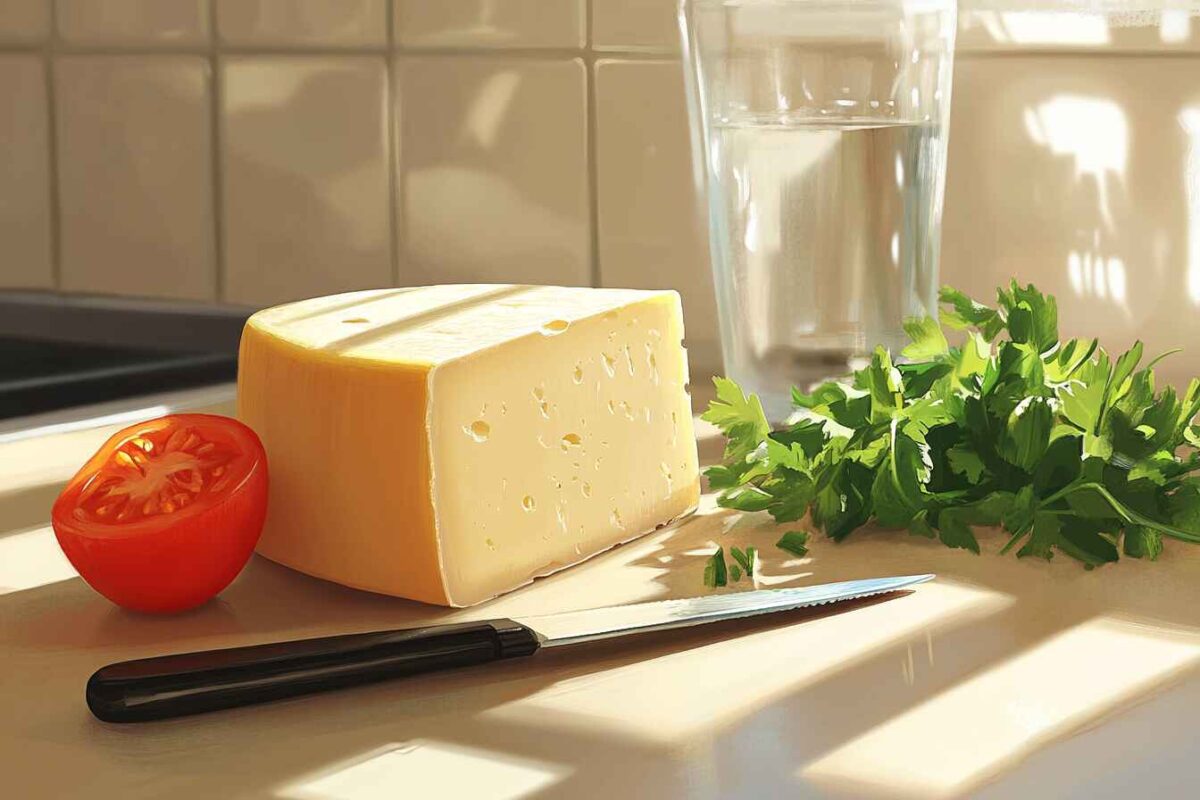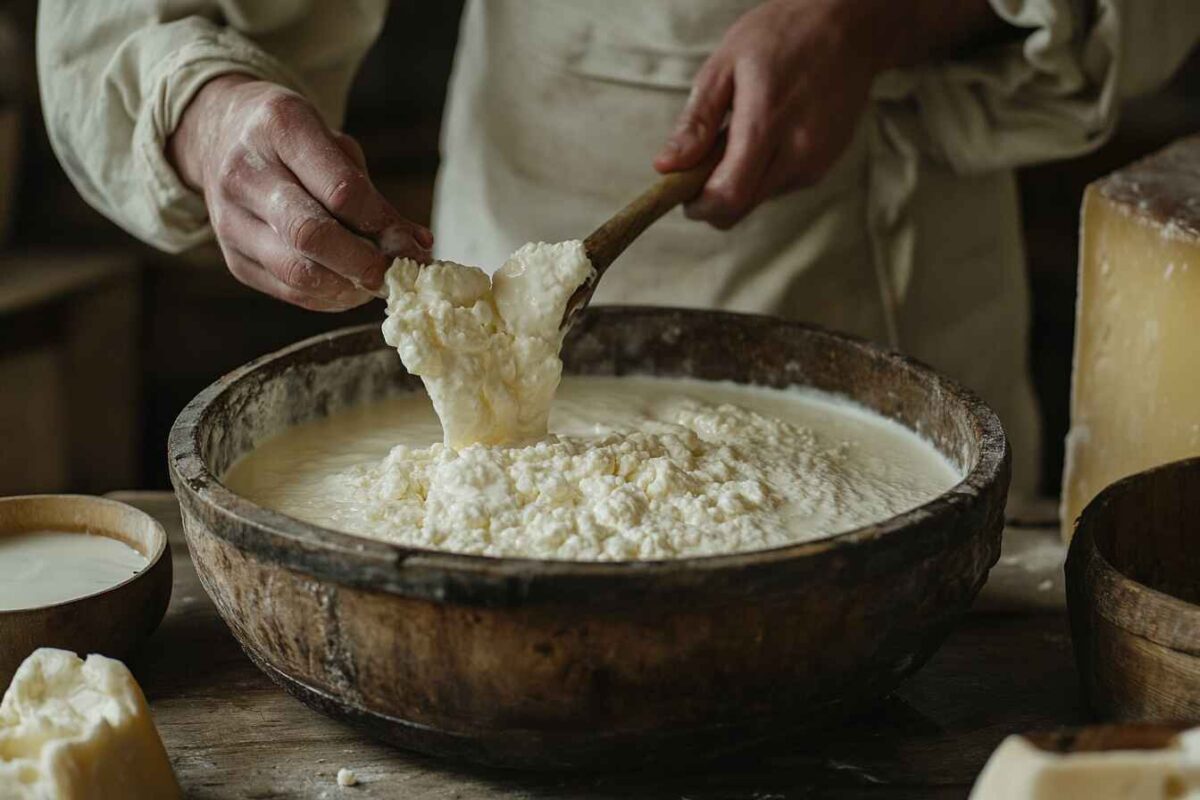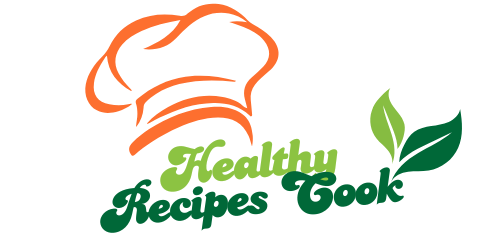Table of Contents
Is provolone cheese vegetarian? Provolone cheese is a semi-hard, Italian-origin cheese made from cow’s milk. Its roots trace back to Southern Italy, where it became popular for its versatile uses in cooking and distinct, mild-to-sharp flavor. Over time, it spread worldwide and is now a staple in many households and recipes.
This cheese falls under the category of pasta filata cheeses, meaning it’s made using a process where curds are stretched and kneaded to create a smooth texture. Provolone typically comes in two main varieties: Provolone Dolce and Provolone Piccante. The Dolce version is milder, aged for two to three months, while the Piccante version is sharper due to a longer aging process and the use of stronger enzymes during production.
Provolone is widely used in sandwiches, melted on pizzas, or served as part of a cheese platter. Its creamy, slightly tangy taste complements a variety of dishes, from pasta bakes to salads.
Despite its popularity, the question “Is provolone cheese vegetarian?” arises frequently. The answer largely depends on how the cheese is made, particularly the type of rennet used in its production a topic we’ll explore further in the next sections.
For more on vegetarian-friendly cheeses, check out Everything About Vegetarian Cheese. This article details which cheeses meet vegetarian dietary standards, including insights into rennet-free alternatives.
Is Provolone Cheese Made with Rennet?
Yes, provolone cheese is traditionally made with rennet, a key ingredient used during the cheese-making process to coagulate milk and form curds. Rennet plays an essential role in determining the texture, flavor, and overall quality of the cheese. However, the source of rennet can vary, which is critical when considering whether provolone cheese is suitable for vegetarians.
Dive deeper into the specific concerns with provolone cheese by visiting Is Provolone Vegetarian?. This piece explores different types of rennet and their implications for vegetarian diets.
There are three main types of rennet used in cheese production:
- Animal Rennet: This is derived from the stomach lining of young calves, making it unsuitable for vegetarians who avoid animal-derived ingredients. Traditional provolone often uses animal rennet, particularly in Italy and other regions with strict adherence to traditional cheese-making methods.
- Microbial Rennet: Produced by fermenting specific fungi or bacteria, microbial rennet is a vegetarian-friendly alternative. Some modern cheese manufacturers opt for microbial rennet to cater to a broader audience.
- Plant-Based Rennet: Extracted from plants like thistle or fig leaves, this type is less common in large-scale production but offers a natural, vegetarian-friendly option.
For vegetarians, the presence of animal rennet in provolone cheese can be a concern. It’s worth noting that not all provolone cheeses are made the same some brands and producers now use microbial or plant-based rennet to cater to vegetarian consumers. Checking the ingredient label or reaching out to the manufacturer is often necessary to confirm.
Do Vegetarians Eat Provolone Cheese?
Whether vegetarians eat provolone cheese largely depends on their dietary preferences and the specific production method of the cheese. While vegetarians typically avoid meat, some also exclude foods that involve the use of animal-derived ingredients, such as rennet sourced from calves.
Lacto-Vegetarians vs. Vegans
- Lacto-vegetarians: These vegetarians consume dairy products, including milk, butter, and cheese, as long as the cheese is free from animal rennet. For this group, provolone cheese may or may not be suitable, depending on the type of rennet used.
- Vegans: Vegans exclude all animal-derived products, including dairy, so provolone cheese is not an option unless it’s a plant-based or vegan alternative.

Why Rennet Matters
Traditional provolone cheese is often made with animal rennet, making it unsuitable for strict vegetarians. However, with increasing demand for vegetarian-friendly products, many manufacturers have begun using microbial or plant-based rennet, which allows vegetarians to enjoy provolone cheese without compromising their diet.
How to Make an Informed Choice
If you’re vegetarian, the key is to check the product label or contact the manufacturer to determine whether animal or vegetarian rennet was used. Some brands clearly mark their products as “vegetarian” or “suitable for vegetarians,” making it easier to identify compatible options.
Ultimately, while some vegetarians can and do eat provolone cheese, others avoid it due to the potential inclusion of animal rennet. Research and label-checking are essential for making an informed decision.
Which Cheese is Vegetarian?
Not all cheeses are suitable for vegetarians due to the use of animal rennet in traditional cheese-making processes. However, many varieties are made with vegetarian-friendly rennet, allowing vegetarians to enjoy cheese without compromising their dietary principles. Here’s a guide to vegetarian-friendly cheeses:
Cheeses Commonly Made with Vegetarian Rennet
- Cheddar: Many commercial Cheddar brands now use microbial or plant-based rennet to cater to vegetarians.
- Mozzarella: Similar to Cheddar, mozzarella made for mass production often avoids animal rennet.
- Cream Cheese: This soft cheese is typically made without rennet, relying on other coagulants like citric acid.
- Paneer: An Indian cheese made by curdling milk with lemon juice or vinegar, making it vegetarian-friendly by default.
- Ricotta: Produced using whey rather than rennet, making most varieties vegetarian-safe.
Provolone Cheese and Vegetarian Suitability
Provolone often falls into a gray area. Traditional versions, especially those made in Italy, commonly use animal rennet. However, some brands, particularly in the U.S., offer vegetarian-friendly versions by substituting animal rennet with microbial or plant-based alternatives.
Certifications to Look For
To determine if a cheese is vegetarian, check for:
- Labels stating “suitable for vegetarians”: These indicate the use of non-animal rennet.
- Certifications: Some brands display vegetarian certification logos to guarantee compliance with dietary standards.
By seeking out labeled vegetarian cheeses, vegetarians can confidently enjoy a wide range of cheese varieties without the uncertainty of hidden animal-derived ingredients.
How to Identify Vegetarian Provolone Cheese?
For vegetarians, selecting provolone cheese that aligns with their dietary restrictions can be challenging, as not all cheeses clearly disclose the type of rennet used in production. Here’s a guide to identifying vegetarian-friendly provolone cheese:
1. Check the Label
Many cheese brands now label their products as “suitable for vegetarians” if they use microbial or plant-based rennet. Look for phrases like:
- “Vegetarian-friendly”
- “Made with non-animal rennet”
- “Microbial enzymes used”
These indicators make it easy to spot vegetarian options.
2. Look for Certifications
Some cheeses carry certifications that guarantee they meet vegetarian dietary standards. Common certifications to watch for include:
- European Vegetarian Union (EVU): A “V-label” symbol indicating vegetarian or vegan suitability.
- Vegetarian Society Approved: A trusted logo for vegetarian products.
3. Research Brands
Not all brands disclose rennet information on their packaging. In these cases:
- Visit the brand’s official website for detailed ingredient information.
- Contact customer service to confirm whether the rennet used is animal-derived or vegetarian-friendly.
4. Explore Vegetarian-Specific Cheese Brands
Certain brands cater specifically to vegetarians by exclusively using microbial or plant-based rennet. Examples include:
- BelGioioso: Offers vegetarian-friendly provolone options.
- Organic Valley: Often uses microbial rennet in their cheese products.
5. Avoid Assumptions
Just because a cheese doesn’t list “animal rennet” doesn’t guarantee it’s vegetarian-friendly. Absence of information doesn’t confirm compliance, so verification is key.
By following these steps, vegetarians can confidently select provolone cheese that meets their dietary needs. Research and attention to labels are essential tools for making an informed choice.
Vegetarian Alternatives to Provolone Cheese
For vegetarians who avoid traditional provolone cheese due to the use of animal rennet, there are plenty of alternatives to consider. These options offer similar textures and flavors while ensuring compliance with vegetarian dietary principles.
Discuss possible substitutes for Provolone and link to:
What Cheeses Can Vegetarians Eat?.
1. Vegetarian-Friendly Provolone Brands
Several cheese manufacturers now cater to vegetarians by using microbial or plant-based rennet. These options provide the authentic taste of provolone without compromising dietary restrictions. Some well-known brands include:
- BelGioioso Provolone: Frequently uses microbial rennet and clearly labels vegetarian options.
- Organic Valley Provolone: Known for offering organic and vegetarian-friendly products.
Always double-check labels or contact the manufacturer to confirm vegetarian suitability.
2. Plant-Based and Vegan Provolone Alternatives
For vegetarians leaning toward a plant-based diet or vegans, there are numerous dairy-free alternatives designed to mimic provolone cheese. These are typically made from:
- Nuts (e.g., cashews, almonds): Provide a creamy base for vegan cheese.
- Coconut oil: Adds richness and texture.
- Potato starch or tapioca starch: Helps achieve the characteristic stretchiness of melted cheese.
Popular vegan cheese brands offering provolone-style slices or blocks include:
- Violife: Known for its rich flavor and meltability.
- Follow Your Heart: Offers provolone-style slices made from plant-based ingredients.
- Daiya: Provides a range of vegan cheeses, including a provolone alternative.
Use this as a segue into recipes or discussions around dairy products, linking to:
Healthy Dairy Foods: Nutrient-Rich Options.
3. Homemade Provolone-Style Cheeses
For those who enjoy DIY projects, making your own vegetarian-friendly provolone-style cheese at home is a great option. A typical recipe might involve:
- Blending cashews or tofu with nutritional yeast for a cheesy flavor.
- Adding agar-agar or tapioca starch for firmness and stretchiness.
- Seasoning with garlic powder, onion powder, and salt to replicate provolone’s savory profile.
4. Other Vegetarian Cheeses to Substitute
If finding vegetarian-friendly provolone is difficult, other cheeses with similar taste and texture can be used as substitutes. Options include:
- Mozzarella: Especially for melting applications like pizza and sandwiches.
- Monterey Jack: Offers a mild, creamy flavor that complements many dishes.
- Smoked Gouda: For recipes that require a smoky, sharp twist similar to provolone piccante.
For a delicious dish featuring cheese, consider Cheesy Pineapple Casserole Recipe, a unique blend of sweet and savory flavors.
Whether you prefer vegetarian-certified provolone or plant-based alternatives, these options ensure that you can enjoy the cheesy goodness without compromising your values.

FAQ: Common Questions About Provolone Cheese
1. Is Provolone just mozzarella?
No, provolone and mozzarella are different types of cheese, although they share some similarities. Both are pasta filata cheeses, meaning they are made using a stretching and kneading process. However:
- Provolone is a semi-hard cheese with a sharper flavor, often aged for months.
- Mozzarella is softer, fresher, and typically eaten unaged, offering a milder taste.
2. Is Provolone cheese suitable for vegetarians?
It depends. Traditional provolone cheese often contains animal rennet, making it unsuitable for strict vegetarians. However, some modern producers use microbial or plant-based rennet, creating vegetarian-friendly options. Always check the label or contact the manufacturer to confirm.
3. Is Provolone made with rennet?
Yes, provolone is made with rennet. In most traditional recipes, animal rennet is used, but vegetarian alternatives may utilize microbial or plant-based rennet. The type of rennet determines whether the cheese is suitable for vegetarians.
4. What cheese is Provolone similar to?
Provolone shares similarities with other semi-hard cheeses like:
- Mozzarella (in texture, as both are pasta filata cheeses).
- Monterey Jack (milder taste and good melting properties).
- Smoked Gouda (sharpness and smokiness, especially in provolone piccante).
- Fontina (rich and creamy with slight sharpness).
Making the Right Choice for Your Diet
Choosing whether to include provolone cheese in your diet as a vegetarian comes down to understanding its production process and the type of rennet used. While traditional provolone often relies on animal rennet, many modern manufacturers have embraced microbial or plant-based rennet to cater to a vegetarian audience. This shift makes it possible for vegetarians to enjoy the rich, tangy flavors of provolone without compromising their dietary principles.
For those seeking alternatives, clearly labeled vegetarian-friendly cheeses or plant-based options offer plenty of delicious substitutes. Brands like BelGioioso and Organic Valley lead the way in offering vegetarian-certified provolone, while vegan brands like Violife provide excellent dairy-free alternatives.
Ultimately, the key is to read labels carefully, research brands, and ask questions when in doubt. With so many options available today, enjoying cheese that aligns with your values and dietary needs has never been easier. Whether you choose traditional provolone, a vegetarian-certified version, or a plant-based alternative, there’s something out there to suit every preference.
By making informed choices, you can savor the best of cheesy goodness while staying true to your lifestyle.

